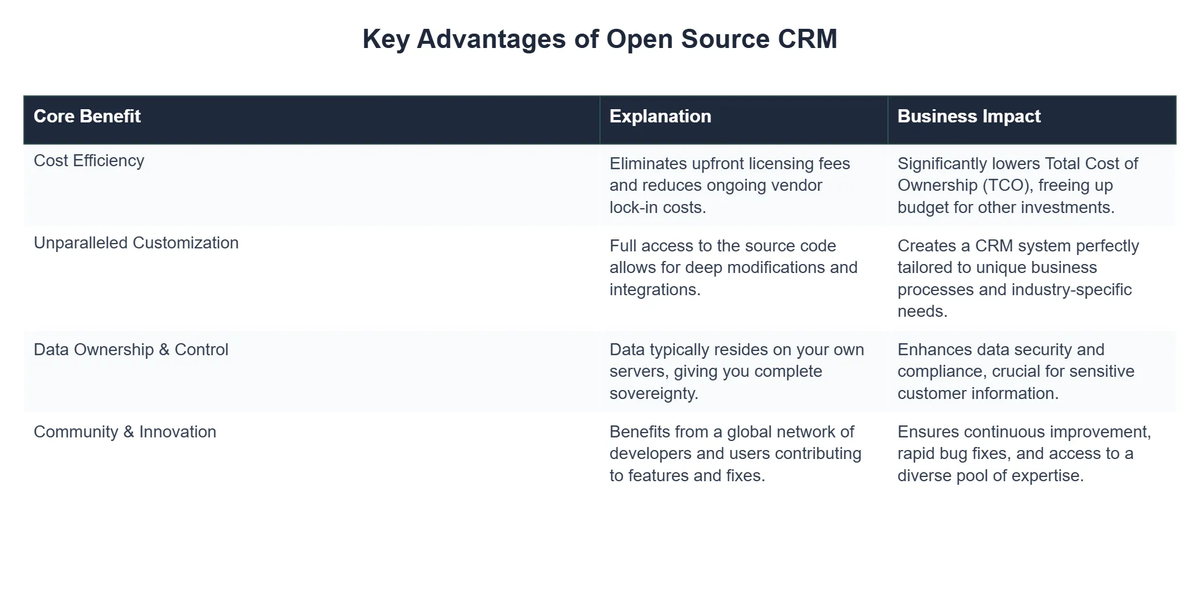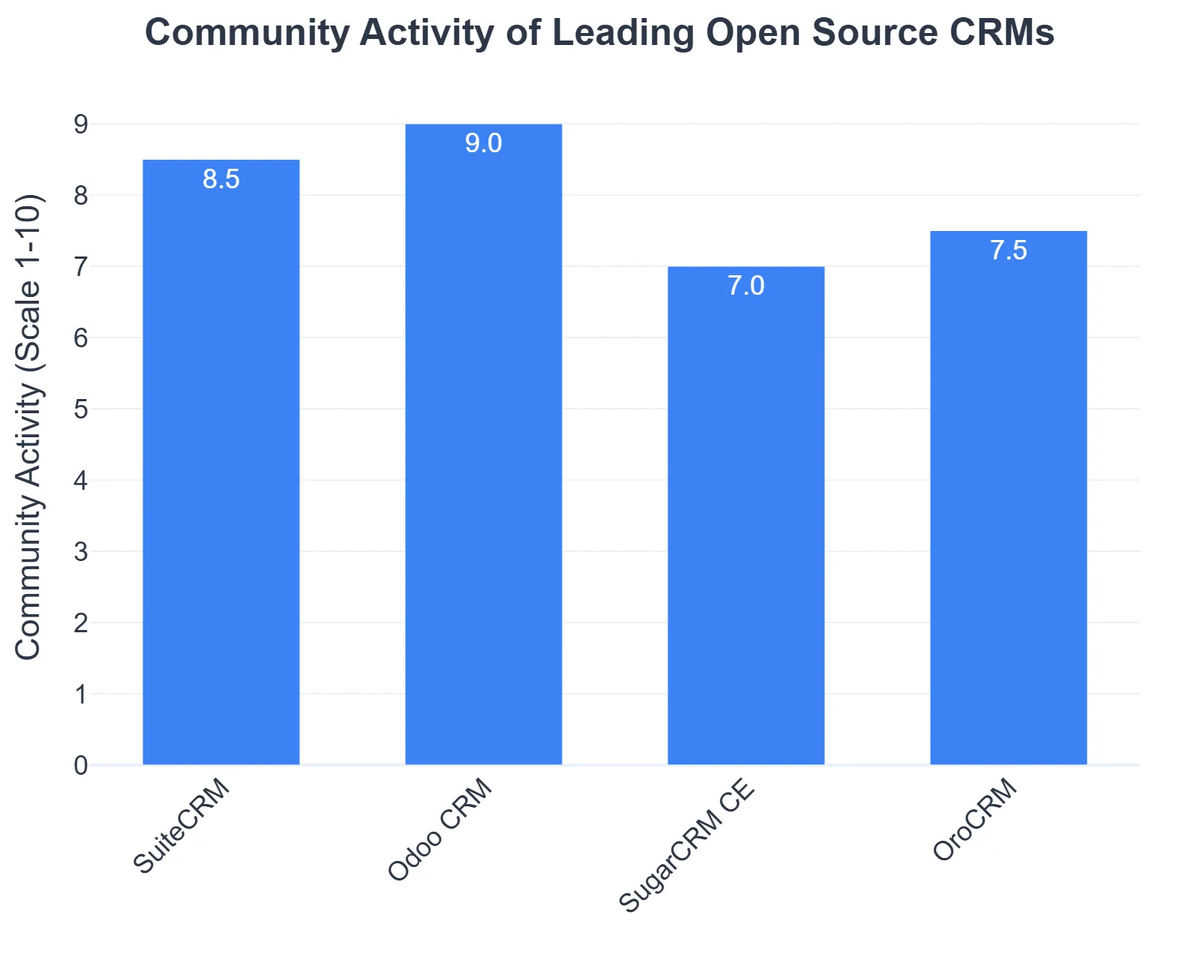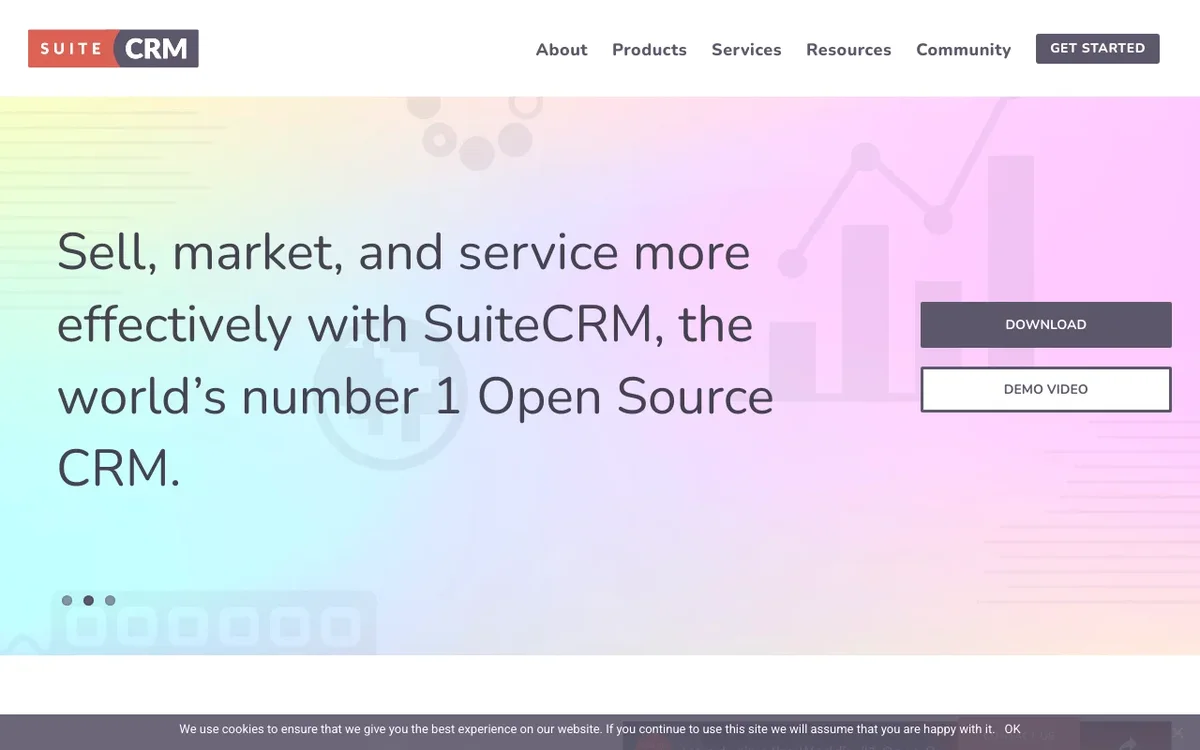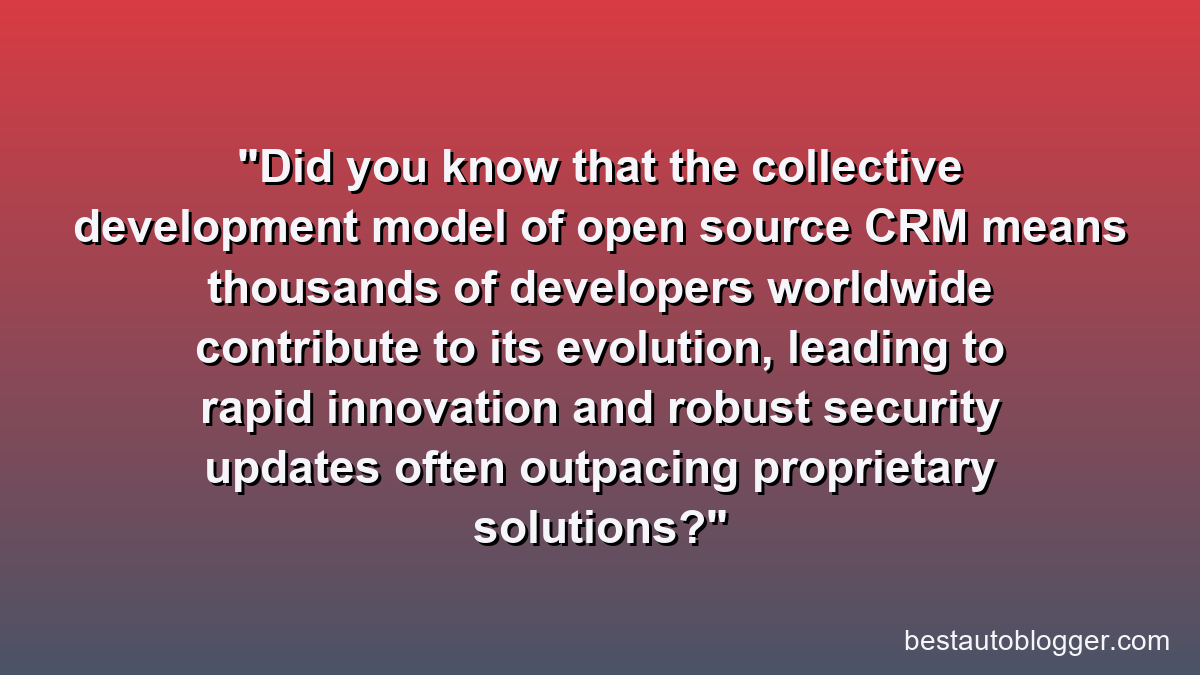In today’s competitive business landscape, a robust Customer Relationship Management (CRM) system is no longer a luxury but a necessity. While many businesses gravitate towards popular proprietary solutions, a compelling alternative exists: open source CRM software. This option offers unique advantages, particularly for organizations seeking greater control, flexibility, and cost efficiency.
SuiteCRM
SuiteCRM delivers a powerful, open-source CRM platform that empowers businesses to take full control of their customer relationships. With comprehensive modules for sales automation, marketing campaigns, and customer service, it offers unparalleled customization and zero licensing fees, making it the strategic choice for organizations looking to optimize their growth and reduce operational costs without compromise.
💡 Key Takeaways
- Open source CRM provides significant cost efficiency by eliminating licensing fees and offering unparalleled customization.
- It grants businesses full data ownership and control, reducing vendor lock-in.
- Selecting the right open source CRM requires careful evaluation of features, community support, scalability, and integration capabilities.
- The open source model fosters a vibrant community, ensuring continuous innovation and robust security updates.
“Open source CRM isn’t just about cost savings; it’s about owning your data and having the agility to tailor the platform precisely to your unique workflows. This level of control is invaluable for long-term strategic growth.”
— Michael Adams, CRM & Automation Implementation Lead
This comprehensive guide dives deep into the world of open source CRM, exploring its fundamental benefits, potential challenges, and highlighting top options available. By the end, you’ll have a clear understanding of whether an open source solution is the right fit for your business’s unique needs, contributing significantly to your overall CRM & Marketing Automation: The Ultimate Guide.
In This Article
- — 💡 Key Takeaways
- → What is Open Source CRM Software?
- — ⚙️ How It Differs from Proprietary CRM
- → Key Benefits of Open Source CRM
- — 💰 Cost-Effectiveness
- — 🚀 Flexibility and Customization
- — 🤝 Community Support and Innovation
- — 🔒 Data Ownership and Security
- → Potential Challenges of Open Source CRM
- — 🛠️ Technical Expertise Required
- — 🤷 Lack of Dedicated Support
- — ⚖️ Scalability and Maintenance Considerations
- → Top Open Source CRM Software Options
- — ⭐️ SuiteCRM: A Powerful & Flexible Solution
- → Who Should Consider Open Source CRM?
- → How to Choose the Right Open Source CRM for Your Business
- — 🎯 1. Assess Your Specific Business Needs
- — 👨💻 2. Evaluate Your Technical Capabilities
- — 🌐 3. Research the Community and Ecosystem
- — 📊 4. Consider Total Cost of Ownership (TCO)
- → Conclusion
What is Open Source CRM Software?
At its core, open source CRM software is a type of Customer Relationship Management system whose source code is freely available to the public. This means anyone can view, modify, and distribute the code, provided they adhere to the terms of its specific open source license (e.g., GPL, MIT, Apache).

⚙️ How It Differs from Proprietary CRM
The distinction between open source and proprietary CRM lies in ownership, access, and control:
- ✅ Proprietary CRM: The source code is owned by a single company, which maintains full control over its development and distribution. Users typically pay licensing fees (monthly or annually) for access and updates. Customization is often limited to configurations offered by the vendor. Examples include Salesforce, HubSpot, and Zoho CRM.
- ➡️ Open Source CRM: The source code is openly accessible. While there are typically no license fees for the software itself, businesses may incur costs for hosting, implementation, customization, and professional support services from third-party vendors or their own IT teams. This model fosters a vibrant community of developers and users who contribute to its evolution.
Key Benefits of Open Source CRM
Opting for an open source CRM can unlock several significant advantages for your business, especially if you have specific requirements or a desire for deeper control.
💰 Cost-Effectiveness
- ✅ No License Fees: This is arguably the most immediate and significant benefit. Unlike proprietary software that demands recurring subscription costs, open source CRM often comes with no direct licensing fees for the software itself.
- ➡️ Reduced Vendor Lock-in: The absence of contractual obligations for licenses means you’re not tied to a single vendor. This provides greater flexibility and negotiation power for support or add-on services.
- 💡 Consider Total Cost of Ownership (TCO): While there are no license fees, remember to factor in costs for hosting, implementation, customization, training, and potential third-party support. However, for many, the TCO can still be significantly lower than a comparable proprietary system. For a broader comparison, see our article on Top CRM Software Options for Your Business.
🚀 Flexibility and Customization
- ✅ Unparalleled Customization: With access to the source code, businesses can tailor the CRM precisely to their unique workflows, industry-specific requirements, and integration needs. This goes beyond simple configuration; you can truly reshape the system.
- ➡️ Integration Capabilities: Open source platforms often boast robust APIs and a community-driven ecosystem, making it easier to integrate with other business tools like ERP systems, marketing automation platforms, or accounting software.
- 💡 Adaptability: As your business evolves, an open source CRM can be adapted and scaled to meet new demands without being constrained by vendor-defined roadmaps or feature sets.
🤝 Community Support and Innovation
- ✅ Vibrant Community: Open source projects thrive on large, active communities of developers, users, and enthusiasts. This community provides a vast knowledge base, forums for troubleshooting, and often contributes to bug fixes and new features.
- ➡️ Continuous Improvement: The collaborative nature of open source development often leads to faster innovation and more frequent updates, driven by real-world user needs rather than a single company’s product roadmap.
🔒 Data Ownership and Security
- ✅ Full Data Control: With an on-premise open source CRM, your data resides on your servers, giving you complete control over it. This is a critical factor for businesses with strict data privacy and compliance requirements.
- ➡️ Enhanced Transparency: The open nature of the code allows for security audits and ensures there are no hidden backdoors or proprietary data harvesting practices. This transparency can build greater trust.
Potential Challenges of Open Source CRM
While the benefits are compelling, it’s crucial to consider the potential drawbacks of open source CRM to make an informed decision.

🛠️ Technical Expertise Required
- ✅ Internal IT Resources: Implementing, maintaining, and customizing an open source CRM often requires in-house technical expertise (developers, system administrators) or reliance on external consultants. This can be a significant hurdle for smaller businesses without dedicated IT staff.
- ➡️ Steeper Learning Curve: Users and administrators may face a steeper learning curve compared to highly polished, user-friendly proprietary solutions that often prioritize ease-of-use out-of-the-box.
🤷 Lack of Dedicated Support
- ✅ Community vs. Vendor Support: While community forums are excellent resources, they don’t replace dedicated, 24/7 technical support from a single vendor. For critical issues, you might need to purchase professional support plans from third-party providers.
- ➡️ Documentation Variation: The quality and completeness of documentation can vary greatly between different open source projects.
⚖️ Scalability and Maintenance Considerations
- ✅ Self-Managed Upgrades: Keeping your CRM updated with the latest versions, security patches, and new features falls on your team or chosen third-party. This contrasts with proprietary cloud CRMs where updates are typically seamless and managed by the vendor.
- ➡️ Performance Optimization: Scaling an open source CRM for a growing user base or increasing data volume often requires specific technical optimizations and infrastructure planning.
Top Open Source CRM Software Options
The open source CRM market offers several robust platforms, each with its unique strengths. One of the most prominent and widely adopted is SuiteCRM.
⭐️ SuiteCRM: A Powerful & Flexible Solution
SuiteCRM is a highly popular and award-winning open source CRM application. It was originally forked from SugarCRM Community Edition and has since developed into a comprehensive, feature-rich platform. It’s renowned for its extensive capabilities and active community.
- ✅ Comprehensive Features: SuiteCRM offers a wide array of modules covering sales force automation, marketing campaigns, customer service, project management, and reporting. It provides tools for lead management, contact management, opportunity tracking, quotes, invoices, and more.
- ➡️ High Customizability: Users can customize nearly every aspect of SuiteCRM, from adding custom fields and modules to modifying layouts and business logic, making it ideal for unique business processes.
- 💡 Active Community & Commercial Support: Beyond its thriving open source community, SuiteCRM also has commercial partners who offer paid support, consulting, and development services, providing a safety net for businesses that require professional assistance.
- 🔗 Integrations: It supports integration with various third-party applications, extending its functionality across your tech stack.
Other notable open source CRMs include Odoo (which offers CRM as part of a larger ERP suite) and Vtiger CRM, both providing different levels of functionality and community engagement. When evaluating options, consider what our guide on Cogmento CRM: A Guide for Business Growth highlights regarding integrated business solutions.
Who Should Consider Open Source CRM?
Open source CRM isn’t a one-size-fits-all solution. It’s particularly well-suited for specific types of businesses and scenarios:
- ✅ Businesses with Unique Workflows: If your operational processes are highly specialized and not well-served by standard CRM configurations, the deep customization offered by open source solutions is invaluable.
- ➡️ Organizations with In-House IT Expertise: Companies with dedicated developers, system administrators, or IT personnel who can manage the implementation, maintenance, and customization will reap the most benefits.
- 💡 Budget-Conscious Businesses: Startups, small to medium-sized businesses (SMBs), or non-profits looking to minimize recurring software licensing costs can find significant savings.
- 🔒 Data-Sensitive Industries: For sectors with stringent data privacy regulations or those that prefer complete control over their customer data, an on-premise open source solution offers peace of mind. For example, our insights on Best Insurance CRM Software for Life Insurance Agents in 2024 often stress data security and compliance.
- 📈 Those Seeking Scalability & Control: Businesses planning rapid growth or those who want the freedom to scale their infrastructure without vendor limitations will appreciate the flexibility.
How to Choose the Right Open Source CRM for Your Business
Selecting the ideal open source CRM requires careful consideration. Here’s a structured approach:
🎯 1. Assess Your Specific Business Needs
- ✅ List Key Requirements: Document essential features for sales, marketing, customer service, reporting, and integrations. Prioritize “must-haves” versus “nice-to-haves.”
- ➡️ Evaluate Customization Needs: How much tailoring will your processes require? Does the CRM’s architecture support that level of modification?
👨💻 2. Evaluate Your Technical Capabilities
- ✅ Internal Expertise: Do you have the in-house IT staff with the necessary skills (e.g., PHP, database management, system administration) to deploy and maintain the system?
- ➡️ Budget for External Support: If not, allocate budget for professional services from third-party consultants or official partners who specialize in the chosen open source CRM.
🌐 3. Research the Community and Ecosystem
- ✅ Community Activity: Look for active forums, regular code contributions, and frequent updates. A vibrant community indicates ongoing development and robust support.
- ➡️ Documentation and Resources: Assess the quality and availability of official documentation, tutorials, and community-contributed guides.
- 💡 Third-Party Integrations & Add-ons: Check for a marketplace or ecosystem of compatible integrations and plugins that extend functionality.
📊 4. Consider Total Cost of Ownership (TCO)
- ✅ Beyond License Fees: Factor in server hardware/hosting, implementation, customization, data migration, training, maintenance, and ongoing support costs.
- ➡️ Time Investment: Remember that open source often requires more internal time investment compared to off-the-shelf solutions. For further reading on pros and cons, consider this resource: The Pros and Cons of Open Source CRM – Wheelhouse.
Recommended Video
Open source CRM software presents a powerful and flexible alternative to proprietary systems, particularly for businesses that value customization, data control, and cost-effectiveness. While it demands a certain level of technical readiness and a commitment to self-management or third-party support, the long-term benefits of tailored functionality and freedom from vendor lock-in can be substantial. By carefully evaluating your needs, capabilities, and the specific options available, you can harness the power of open source to build a CRM solution that truly drives your business growth. For more details on choosing the best fit for your business, check out this guide on Best Open Source CRM Software.
What are the primary advantages of using open source CRM software?
The main advantages include significant cost savings (no licensing fees), greater flexibility and customization options, full ownership of your data, and robust community support for ongoing development and troubleshooting.
Is open source CRM as secure as proprietary CRM solutions?
Yes, open source CRM can be highly secure. Its transparency allows a global community to identify and fix vulnerabilities quickly, often faster than proprietary systems. Security largely depends on proper implementation, regular updates, and the project’s active community.
How do I choose the best open source CRM for my business?
Consider your specific business needs, budget, required features, scalability, and ease of integration with existing systems. Evaluate the community’s activity, available documentation, and the level of technical expertise required for setup and maintenance.
Can open source CRM integrate with other business tools like ERP or marketing automation?
Most modern open source CRM solutions offer strong integration capabilities through APIs or direct connectors. This allows them to seamlessly connect with other business-critical tools such as ERP systems, marketing automation platforms, accounting software, and communication tools.
SuiteCRM
Ready to take the next step? See how SuiteCRM can help you achieve your goals.







